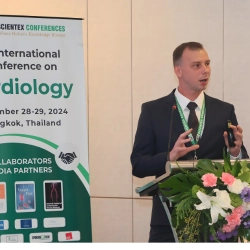
Evgenii Kropotkin
FSBI “Federal Centre of Cardiovascular Surgery” of the Ministry of Health of the Russian Federation, Russian FederationPresentation Title:
Totally nonfluoroscopic approach for interventional arrhythmology. Experience of 6000 procedures
Abstract
Introduction:
Catheter ablation of cardiac arrhythmias is routinely performed under fluoroscopy guidance. It is well known now that radiation exposure can cause skin injuries, cataracts, and even malignancies for patients and medical staff. Long-term work with protective aprons is the reason for supine problems. Nonfluoroscopic electroanatomical mapping systems (EAM) and intracardiac ultrasound (ICE) can help to decrease the use of fluoroscopy and sometimes perform total nonfluoroscopic procedures. We perform experience of totally nonfluoroscopic approach in interventional arrhythmology.
Materials and methods:
From March 2014 to January 2025, we performed 6054 totally nonfluoroscopic interventional arrhythmology procedures by using 3 EAM: CARTO 3 (Johnson&Johnson), NavX (Abbott Laboratories), Rhythmia DX (Boston Scientific); and 2 ultrasound systems Sequoia (Siemens GE) and Vivid q (General Electric). Written informed consent was signed by every patient. We performed 3250 catheter ablations of atrial fibrillation, including 450 cryoballoon ablations. 608 AVNRT ablation, 611 WPW syndrome ablation, 814 typical/atypical flutter ablation, 502 premature ventricular contraction/ ventricular tachycardia, 167 premature atrial contraction, 48 pacemaker/cardioverter-defibrillator implantation. The control group (fluoroscopy – guided; gold standard) for every arrhythmia was analyzed and compared with zero fluoro group to assess safety and efficacy. We included in an observational study two groups of patients: pregnant women and children, where a totally nonfluoroscopic approach was a variant of choice.
Results:
We presented one of the biggest experience of zero fluoro procedures in the world. Learning curve differed for every arrhythmia type. After learning curve period there was no significant difference in procedure time between control and experienced groups for every arrhythmia type. Mean follow up period was 18,6 + 12,4 months. Eleven conversions from nonfluoroscopic to fluoroscopic - guided procedures were performed due to vascular access features 9 patients (7 venous approach, 2 arterial approach) or complex cases. Complication rate was comparable in both groups and was acceptable for every variant type of arrhythmia treatment. No deaths were revealed in both groups. In case of cardiac tamponade, pericardial puncture was performed under fluoroscopy guidance.
Conclusion:
Totally nonfluoroscopic approach in interventional arrhythmology is safe, effective and feasible and can be used in every cath lab to decrease side effects of radiation exposure for patients and medical personnel. Cost of such procedures usually higher when compared to fluoroscopy guided. Totally nonfluoroscopic approach in special groups of patients: pregnant women and children should be used in experienced centers. This is retrospective data and single center experience. More prospective multinational and multicenter data needed for comprehensive assessment of safety, effectiveness and applicability of zero fluoroscopy approach.
Biography
Dr. Evgenii Kropotkin is a distinguished cardiologist from the Federal Center for Cardiovascular Surgery, Russian Federation.

